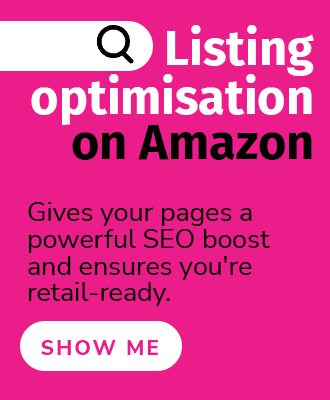Any seller or vendor looking to expand in Europe must ensure they understand the UK, EU and country specific selling requirements, as well as Amazon requirements and be fully compliant with them. It is also important that a business assesses the costs and viability when operating in these marketplaces.
Fulfilment
When it comes to selling in Europe, if you have been invited to become a vendor and have assessed that this is the best channel on Amazon for your business, you won’t need to select the type of program. All you will need to do is set the vendor account up and Amazon will raise orders that you will then need to fulfil.
On the seller side, you will first need to decide whether or not you wish to manage orders via Fulfilment by Amazon (FBA), Merchant Fulfilled (MFN) or Seller Fulfilled Prime (SFP). If you select MFN, avoid fulfilling orders directly from the US, consider a 3PL in Europe. Whilst this is possible for some categories, there is a high risk of delays at customs, resulting in a negative customer experience and potentially poor seller feedback and not hitting certain seller performance metrics. If long term your plans are to go SFP, make sure you find a 3PL that can work towards the shipping requirements.
Going FBA is the easiest route and the option most international sellers launching in Europe will take. In Europe there are 3 different types of seller programs when it comes to FBA:
- European Fulfilment Network (EFN): Allows sellers in Europe to store their inventory in their local fulfilment centre and fulfil orders from other European marketplaces by shipping products from local inventory. For example; fulfilling an order from Amazon Spain from inventory in the UK. Now the UK is no longer part of the EU, this has changed how EFN works. Before, any seller in the FBA EFN program could receive orders from any EU marketplaces and fulfil the order from UK inventory and vice versa. Post Brexit, this is possible between EU countries but not between the UK and EU. However, Amazon has recently reintroduced EFN between the UK and EU but sellers need to apply, products must be eligible and not exceed €135 or £122.
- Multi-Country Inventory (MCI): Allows sellers to dispatch FBA inventory to Amazon fulfilment centres in multiple countries of their choice across Europe. This works for sellers selling to a select few marketplaces to start with and is a good solution to managing inventory between the UK and EU, by having stock in the UK and one EU marketplace e.g. Germany.
- Pan European (Pan EU): Allows sellers to sell across all European marketplaces, sellers send inventory to one EU fulfilment centre and then Amazon redistributes the inventory across their EU fulfilment network in the enabled countries in line with customer demand and at no additional cost. This excludes the UK and works well for sellers selling to multiple EU countries.
Currency
When selling in Europe, you will be trading in two different currencies, for the UK pound sterling (GBP) and euros for all other European marketplaces. Trading in foreign currency will result in losses and gains when converting the monies back into US dollars or another home currency, as well as some additional foreign exchange costs. To receive funds you could use your home bank account, however that typically results in paying higher fees and getting less favourable exchange rates. There are companies out there such as Payoneer that can be used as a local bank account that have lower fees, who will then convert and transfer the funds into your home bank account.
Product compliance
All sellers and vendors must understand the legal requirements for their product category and ensure they are both country specific and EU compliant. Product compliance will apply at country and EU level, there are some country specific requirements as well as EU directives that businesses must adhere to depending on the category they sell in. For example, grocery needs all labels written in the language of the marketplace they are being sold in, CE marking for electronics and toys and WEE legislation for the disposal of electronic and electrical equipment. We also recommend familiarising yourself with UK and EU consumer rights as these differ from the US and other international marketplaces.
Sales tax/VAT
To understand your legal tax obligation across the different countries in Europe, make sure you consult a tax advisor. Companies that some of our clients work with include SimplyVAT and Avalara. A tax consultant will be able to identify which countries you need to be VAT registered in and assist you with the registration. The type of seller program you enrol in and where you hold inventory will influence this. In addition, they can provide you with ongoing support when it comes to managing your VAT returns with the HMRC (tax office). They will also assist you in applying for an EORI number, which is requested when importing goods and paying customs in the UK and EU.
Customer service
Decide how you are going to manage customer service for each marketplace. If you use FBA the level of customer service will be reduced, however queries will still come in. Some businesses may manage the responses on an ad hoc basis using freelance translator support initially to gauge the demand and whether ongoing support is needed. Some businesses will use machine based translation tools to answer queries, which is something we do not recommend as the responses are not grammatically correct, can have a different meaning and potentially result in a negative customer experience.
International shipping
You will need to identify and appoint a shipping company to manage your international shipment. There are many companies out there so make sure when talking with them you check that they will manage customs on your behalf and have a clear idea of all the import costs including cost of freight, insurance, customs duties, VAT and any other additional charges. Global Ecommerce Experts will be able to assist you with your international shipping and are experienced working with US companies selling into Europe. They can also offer additional services such as warehousing and managing VAT.
3P logistics provider
Many sellers and vendors ask whether holding inventory in the UK or mainland Europe is needed if they sell to Amazon as a vendor and via FBA as a seller. With Amazon placing orders little and often on the vendor side and having stock limits on the quantity that can be sent in and stored at Amazon on the seller side, it is recommended to have inventory readily available in that marketplace or close to that marketplace to fulfil orders, to support increases in demand and manage returns. There are many 3P logistics companies out there including Global Ecommerce Experts for Europe and Ogden Fulfilment for the UK.
Trademark
If you are a brand owner, make sure you register your trademark to cover Europe. When registering your brand you can do this at an EU level or marketplace specific. The EU ends up being cheaper given the number of countries in the EU. However note that the UK is no longer part of the EU and you will need to register a separate trademark in the UK. Any new EU trademark registrations will not cover the UK.
Now you have an understanding of the operations side of things, go to part 3 of our Amazon Europe blog series for tips on getting your products listed and generating sales.
If you need assistance on your Amazon Europe journey, contact us to see how we can help.
Disclaimer: This is only a guide and we are not specialists in VAT, product compliance and any other country specific selling requirements. Please ensure you consult the required specialists and work with Amazon approved providers where needed.




